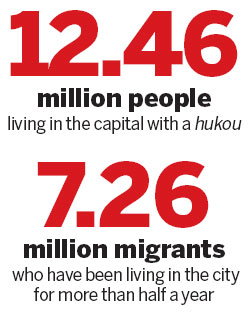Beijing's population surges near 20 million
Wu Shoulun, a retired professor from Beihang University who is also a member of the congress's research team, said in a media report that every aspect of people's daily life can be influenced by the huge population, as it leads to high-priced-apartments, chaos on public transportation and challenges for the education system. Maya Reid, a 25-year-old woman from Canada, has noticed the sharp rise in the capital's population since she arrived in Beijing four years ago.
"My home country has a population of 30 million. It's not like we can find a seat in subway every time but it has never been so packed and you can always find a place to breathe," said Reid who, commutes to work each day on Beijing's subway.
Figures show that around 32.3 percent of commercial apartments were sold to people who did not have Beijing permanent residency papers between 2005 and 2009. In 2008, 40 percent of students in compulsory education in Beijing were from the floating population. Both facts suggest the floating population is growing massively.
"It is time for the government to take into consideration proper population control," Wu told the Beijing Daily on Wednesday.
His team suggested that the government changes the current industry structure in Beijing, opening more hi-tech companies and attracting more high-end people to Beijing instead of laborers.
However, Mu Guangzong, a professor from the Institute of Population Research with Peking University, had a different point of view.
"I believe the market can help with the adjustment of population. High-end people will also need someone to help them with housekeeping and other stuff," Mu told METRO on Thursday.
"People who are useful for society will stay and those who are not may leave gradually."
Mu said the reason why Beijing attracts more people than any other cities is because the capital is a better place to live than many other cities.
"The root lies in the huge different living standards between big cities and small villages. And the difference is still increasing," he said.
 0
0 







